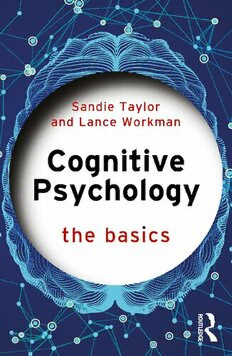Table Of ContentCOGNITIVE PSYCHOLOGY
THE BASICS
Cognitive Psychology: The Basics provides a compact introduction to the core
topics in the field, discussing the science behind the everyday cognitive
phenomena experienced by us all. The book considers laboratory and applied
theory and research alongside technological developments to demonstrate how
our understanding of the brain’s role in cognition is improving all the time.
Alongside coverage of traditional topics in the field, including attention and
perception; learning and memory; thinking, problem-solving and decision-
making; and language, the book also discusses developments in interrelated
areas, such as neuroscience and computational cognitive science. New
perspectives, including the contribution of evolutionary psychology to our
understanding of cognition, are also considered followed by a thoughtful
discussion of future research directions. Using real-world examples throughout,
the authors explain in an accessible and student-friendly manner the role our
human cognition plays in all aspects of our lives.
It is an essential introductory text suitable for all students of cognitive
psychology and related disciplines. It will also be an ideal read for any
reader interested in the role of the brain in human behaviour.
Sandie Taylor is an experienced lecturer and author. Her DPhil in cognitive
psychology focused on memory, in particular face recognition, and applied
memory approaches to facilitate recognition of faces. She has previously
published four books and many peer reviewed articles and book chapters.
Lance Workman is Visiting Professor of Psychology at the University of
South Wales. He was formerly Head of Psychology at Bath Spa
University. Lance has published widely in psychology including over 100
articles and nine books. For seven years he was interviews editor for The
Psychologist and regularly appears in the media.
The Basics
The Basics is a highly successful series of accessible guidebooks which
provide an overview of the fundamental principles of a subject area
in a jargon-free and undaunting format.
Intended for students approaching a subject for the first time, the
books both introduce the essentials of a subject and provide an ideal
springboard for further study. With over 50 titles spanning subjects from
artificial intelligence (AI) to women’s studies, The Basics are an ideal
starting point for students seeking to understand a subject area.
Each text comes with recommendations for further study and
gradually introduces the complexities and nuances within a subject.
Town Planning
Tony Hall
Women’s Studies (second edition)
Bonnie G. Smith
English Grammar
Michael McCarthy
Pragmatics
Billy Clark
World Prehistory
Brian M. Fagan and Nadia Durrani
For a full list of titles in this series, please visit www.routledge.com/
The-Basics/book-series/B
COGNITIVE PSYCHOLOGY
THE BASICS
Sandie Taylor and Lance Workman
First published 2022
by Routledge
2 Park Square, Milton Park, Abingdon, Oxon OX14 4RN
and by Routledge
605 Third Avenue, New York, NY 10158
Routledge is an imprint of the Taylor & Francis Group, an informa business
© 2022 Sandie Taylor and Lance Workman
The right of Sandie Taylor and Lance Workman to be identified as authors of this
work has been asserted by them in accordance with sections 77 and 78 of the
Copyright, Designs and Patents Act 1988.
All rights reserved. No part of this book may be reprinted or reproduced or utilised
in any form or by any electronic, mechanical, or other means, now known or
hereafter invented, including photocopying and recording, or in any information
storage or retrieval system, without permission in writing from the publishers.
Trademark notice: Product or corporate names may be trademarks or registered
trademarks, and are used only for identification and explanation without intent to
infringe.
British Library Cataloguing-in-Publication Data
A catalogue record for this book is available from the British Library
Library of Congress Cataloging-in-Publication Data
A catalog record has been requested for this book
ISBN: 978-0-367-85686-1 (hbk)
ISBN: 978-0-367-85685-4 (pbk)
ISBN: 978-1-003-01435-5 (ebk)
DOI: 10.4324/9781003014355
Typeset in Bembo
by MPS Limited, Dehradun
For Dafydd
CONTENTS
Acknowledgements viii
1 What is cognitive psychology? 1
2 Relationship between brain structure, function
and cognitive modelling 24
3 Attention and perception 50
4 Memory and learning 84
5 Thinking: decision-making and problem-solving 127
6 Language and communication 164
7 Consciousness and metacognition 197
8 Cognitive neuropsychology 221
9 Future directions of cognitive psychology 243
Glossary 261
References 264
Index 295
ACKNOWLEDGEMENTS
We would like to acknowledge Professor Ray Bull. Also to Sandie
Taylor for 92 per cent of the figure work.
•
1
WHAT IS COGNITIVE
PSYCHOLOGY?
Cognitive psychology is concerned with how we process in-
formation. It has been eloquently defined by the American
Psychological Association (APA) in 2020 as “the branch of psy-
chology that explores the operation of mental processes related to
perceiving, attending, thinking, language, and memory, mainly
through inferences from behavior”. The exploration of mental
processes is not new. For a very long time, philosophers and ‘sci-
entists’ have been fascinated by the connection between our mind,
mental processes and the brain. Studying the brain using ‘scientific’
methodology began during the Renaissance period; a time in
European history arguably between 1400 and 1700. It was during
this period that scholars became interested in studying nature,
which included the mechanics of the human body. Great thinkers
such as René Descartes pondered over the philosophical approach
of ‘dualism’ to understand the difference between mind and body.
He believed the two were separate from each other such that our
body (including the brain) represented a physical entity while the
mind represented a spiritual one. The implication of this is that the
mind can exist independently of the body. Conversely, monism
described the mind and body as coexisting. With the development
of scientific technology used to map the brain, the notion of the
mind existing separately from the physical brain became very un-
likely. Nevertheless, Descartes helped expand our way of thinking
about the mind and body interface. Even today with our extensive
explorations inside the working brain, finding direct connections
between structure and function is not always straightforward (see
Chapter 2). It could be argued that ideas from dualism and monism
DOI: 10.4324/9781003014355-1

